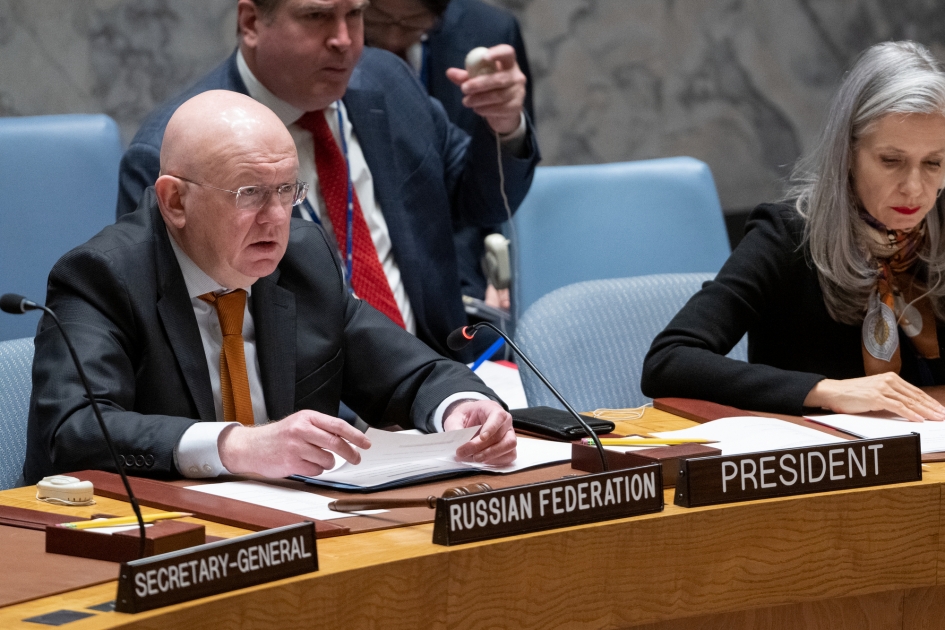Statement by Permanent Representative Vassily Nebenzia at UNSC briefing on the situation in the Great Lakes Region
Colleagues,
We thank Special Envoy Huang Xia and Chair of the Peacebuilding Commission, Ambassador Šimonović of Croatia, for the briefings. We welcome the representatives of Burundi, the Democratic Republic of the Congo, and Rwanda to this meeting.
The state of affairs in the Great Lakes region is mainly defined by the situation in eastern DRC.
The ongoing confrontation of governmental forces with M23 in North Kivu, as well as the tension in bilateral relations of Kinshasa and Kigali raise particular concern. Armed forces of the DRC, MONUSCO, and East African Community (EAC) forces are preoccupied with the M23 problem. Other illegal armed formations make use of this situation to enhance their illicit activities, attack civilians, exploit natural resources with impunity, and consolidate positions in the east of the country. As was said here earlier, natural resources are one of the factors of instability that we see in the Great Lakes Region.
The deteriorating security aggravates the situation in the region and adds to the sufferings of ordinary people. Security Council members who went on a working mission to Kinshasa and Goma on 9-12 March 2023, were able to see with their own eyes how dire the humanitarian situation is in eastern DRC.
We think it important to keep looking for a diplomatic settlement to this conflict, i.a. in the framework of the Luanda and Nairobi formats. Our priority task is to achieve a cessation of hostilities and launch a comprehensive inclusive dialogue. In this regard, we count on regional efforts to be effective and lead up to creating conditions that should promote the inter-Congolese negotiation process and recover good neighborly relations of the DRC and Rwanda. In general terms, it seems wise to continue combining complementary efforts and initiatives for regional assistance in order to achieve tangible results.
We hope that the shared vision that was elaborated at the 20th Extra-Ordinary EAC Summit in Bujumbura in early February, as well as meetings of EAC members and the International Conference for the Great Lakes Region on the sidelines of the 36th summit of the African Union that convened in mid-February in Addis-Ababa, will foster the implementation of the Luanda roadmap and help push M23 back from the areas that they hold at the moment. We trust that the Angolan contingent will play a constructive role supporting the Special Verification Mechanism.
We support the efforts of MONUSCO and its leadership. Presence of the Blue Helmets in the conflict zone is an important stabilizing factor.
Protests against the presence of MONUSCO that have taken place recently are concern raising. Attacks on peacekeepers are unacceptable. It is important for MONUSCO not only to reach out to the local population clarifying the goals of their presence and the essence of their mandate, but also to listen to the opinion of the community and authorities. This will allow for better performance of the Mission.
We are firmly convinced that plans for withdrawal of MONUSCO should proceed from the situation on the ground and avoid artificial deadlines. As prescribed by UNSC resolution 2666, we expect the Secretary-General to put forward proposals as regards reforming the configuration of MONUSCO on the basis of the ongoing consultations with Kinshasa by July this year.
In order to boost efforts for protection of the Congolese population, we think MONUSCO needs to step up coordination with the DRC armed forces, as well as regional and national mechanisms that are involved in conflict settlement. We note the significant role of the international organizations of the UN system in alleviating the humanitarian burden.
Apparently, lasting normalization in eastern DRC and GLR cannot be ensured by military measures alone. It will also take dialogue, effective confidence building measures, consolidation of regional states who should realize their shared responsibility and also the fact that stabilization in the Great Lakes Region (where various stakes are intertwined closely) will meet their practical interests. Peaceful and sustainable development, mutually beneficial cooperation and commitment to finding collective solutions to longstanding problems, i.a. those related to the illegal exploitation of natural resources which is among the key factors underpinning the armed conflict, will be beneficial for all countries of the Great Lakes Region.
We call to intensify efforts to implement the fundamental 2013 Peace, Security, and Cooperation Framework for eastern DRC and GLR to the full extent. We welcome the commitment of the African Union to revitalizing this document.
On our part, we reiterate our readiness to promote stabilization in the GLR by encouraging dialogue and constructive cooperation among regional states. We are committed to a close interaction with relevant institutions of the UN system and their representatives.
In conclusion, Russia fully supports the activities of SESG Xia aimed at establishing inter-state dialogue and mitigating tension in this part of Africa.
Thank you.
